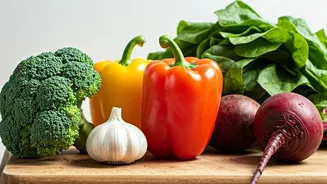Liver's Silent Battle
Fatty liver disease is a growing health concern, often going unnoticed until its advanced stages. Understanding the role of the liver is key; it's responsible
for filtering toxins, processing nutrients, and producing bile essential for digestion. When fat accumulates in the liver, it can lead to inflammation and damage. This underscores the importance of dietary choices in protecting liver health. Fortunately, nature offers readily available solutions in the form of vegetables. These foods contain compounds that support liver function and help combat the effects of fatty liver disease. By including these vegetables in your diet, you can proactively contribute to the well-being of your liver, mitigating risks and promoting overall health.
Cruciferous Champions
Vegetables from the cruciferous family, like broccoli, cauliflower, and Brussels sprouts, are packed with nutrients that support liver detoxification. These vegetables are rich in glucosinolates, compounds that help the liver produce enzymes crucial for processing toxins. The liver uses these enzymes to neutralize harmful substances, which promotes the efficient elimination of these substances from the body. Consuming cruciferous vegetables regularly can enhance this detoxification process, reducing the burden on the liver. Additionally, these vegetables provide antioxidants that combat inflammation and oxidative stress. Incorporating cruciferous vegetables into meals can offer a natural pathway to support liver health. They can be steamed, roasted, or added to salads for versatile and beneficial dietary additions.
Leafy Green Wonders
Leafy greens like spinach and kale are nutritional powerhouses, contributing significantly to liver health. Rich in antioxidants and chlorophyll, these greens can help neutralize free radicals and protect the liver from damage. The high fiber content aids in the elimination of waste products. These vegetables also support the liver's detoxification pathways. Spinach and kale contain compounds that stimulate the production of detoxifying enzymes. Regular consumption of leafy greens provides essential vitamins and minerals, supporting overall health and liver function. Whether added to smoothies, salads, or cooked dishes, leafy greens offer a simple yet effective way to support liver well-being. These are not only versatile but also easy to integrate into daily meals.
Beets: Root of Wellness
Beets are another valuable addition to a liver-friendly diet. Beets contain betaine, a compound that can help protect and improve liver function. Betaine is effective in reducing fat accumulation in the liver, thus lowering the risks associated with fatty liver disease. Beets are also packed with antioxidants, which help fight inflammation and reduce the impact of oxidative stress. They contain compounds that support the liver's detoxification pathways. Additionally, beets provide a good source of fiber, promoting healthy digestion. Adding beets to your diet can be both tasty and beneficial. They can be eaten raw in salads, juiced, or roasted. Beets’ unique nutritional profile makes them a great option for improving liver health.
Garlic's Protective Power
Garlic is a potent ingredient with several health benefits, including positive effects on liver function. Garlic contains sulfur compounds that activate liver enzymes responsible for detoxification. These enzymes help the liver filter toxins and promote efficient elimination. Garlic also has antioxidant properties, which shield liver cells from damage caused by free radicals. The addition of garlic can reduce inflammation and oxidative stress in the liver. Including garlic in your diet is a simple way to support liver health. Whether used raw, cooked, or as a flavoring agent, garlic delivers valuable benefits. Its strong flavor adds depth to meals while simultaneously supporting a healthier liver.











